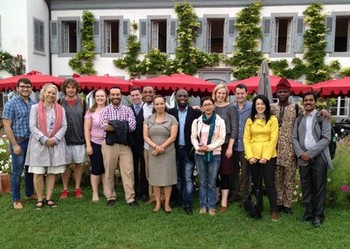New forms of ecumenical formation, as well as ways of enhancing ecumenical contributions from young people in churches and societies, were discussed by 15 young theologians in a meeting convened by the World Council of Churches (WCC).
The meeting, held from Sept. 7-10 here, brought together participants who previously served as tutors for the Global Ecumenical Theological Institute (GETI), a theological education program held at the WCC 10th Assembly in Busan, Republic of Korea in autumn 2013.
These young theologians came from the United States, India, Nigeria, Argentina, Germany, Sweden, the Czech Republic, South Africa and Indonesia.
Together in a four-day meeting they highlighted the importance of collaborations between young people working together on issues of social relevance, dialogue and constructive debates on issues of faith.
Speaking about their participation in GETI, they shared how this experience became integral to their work for churches and communities. Building networks and sharing of ecumenical ideas is vital for the ecumenical formation of young people, they said.
Participants in the meeting also learned about the WCC’s programs, in particular, continuation of the GETI program, which in future will be held at major ecumenical events. They also discussed how the WCC’s work will unfold around the theme of a “pilgrimage of justice and peace.”
The GETI tutors affirmed their commitment in perpetuating “life-changing experience of coming from all regions of the world and engaging in dialogue on faith and the current state of societies.” This is crucial, said Sara Gehlin from Sweden, arguing that a space of ecumenical exposure for young theologians offers “learning on every level, for which receptive ecumenism can serve as an inspiring model.”
The participants discussed their learning experiences, themes and methodologies used in the GETI programme. They offered creative ideas on how to engage in dialogue at the global and local levels, with inclusivity and cultural sensitivity.
These young theologians called the GETI program “an excellent way of building contacts, underlining students’ readiness to broaden the ecumenical movement.”
“I am hopeful that our work together persists and that we can continue, in this collaborative spirit, to improve ecumenical formation around the world,” said Derick Dailey from the U.S.A.
During the meeting, participants also visited the Ecumenical Institute in Bossey.

